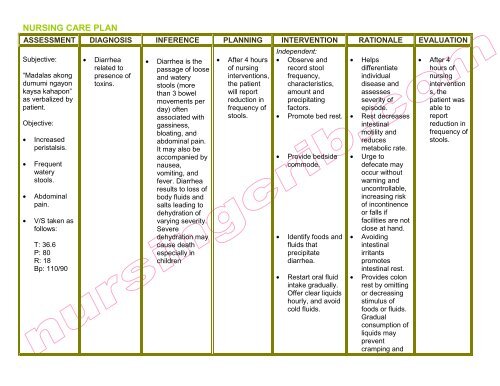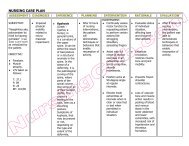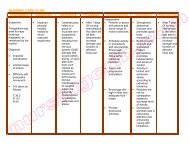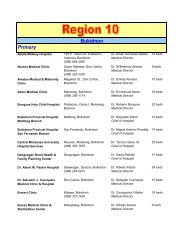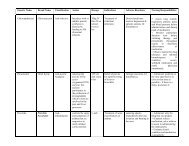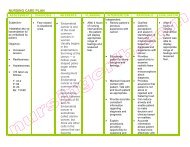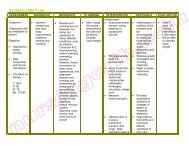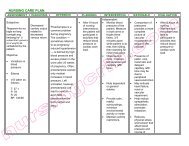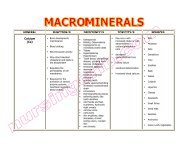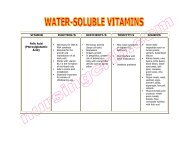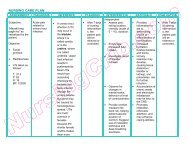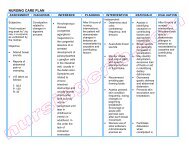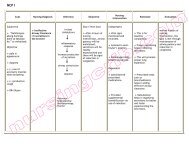NURSING CARE PLAN - diarrhea - Nursing Crib
NURSING CARE PLAN - diarrhea - Nursing Crib
NURSING CARE PLAN - diarrhea - Nursing Crib
Create successful ePaper yourself
Turn your PDF publications into a flip-book with our unique Google optimized e-Paper software.
<strong>NURSING</strong> <strong>CARE</strong> <strong>PLAN</strong><br />
ASSESSMENT DIAGNOSIS INFERENCE <strong>PLAN</strong>NING INTERVENTION RATIONALE EVALUATION<br />
Subjective:<br />
“Madalas akong<br />
dumumi ngayon<br />
kaysa kahapon”<br />
as verbalized by<br />
patient.<br />
Objective:<br />
• Increased<br />
peristalsis.<br />
• Frequent<br />
watery<br />
stools.<br />
• Abdominal<br />
pain.<br />
• V/S taken as<br />
follows:<br />
T: 36.6<br />
P: 80<br />
R: 18<br />
Bp: 110/90<br />
• Diarrhea<br />
related to<br />
presence of<br />
toxins.<br />
• Diarrhea is the<br />
passage of loose<br />
and watery<br />
stools (more<br />
than 3 bowel<br />
movements per<br />
day) often<br />
associated with<br />
gassiness,<br />
bloating, and<br />
abdominal pain.<br />
It may also be<br />
accompanied by<br />
nausea,<br />
vomiting, and<br />
fever. Diarrhea<br />
results to loss of<br />
body fluids and<br />
salts leading to<br />
dehydration of<br />
varying severity.<br />
Severe<br />
dehydration may<br />
cause death<br />
especially in<br />
children<br />
• After 4 hours<br />
of nursing<br />
interventions,<br />
the patient<br />
will report<br />
reduction in<br />
frequency of<br />
stools.<br />
Independent:<br />
• Observe and<br />
record stool<br />
frequency,<br />
characteristics,<br />
amount and<br />
precipitating<br />
factors.<br />
• Promote bed rest.<br />
• Provide bedside<br />
commode.<br />
• Identify foods and<br />
fluids that<br />
precipitate<br />
<strong>diarrhea</strong>.<br />
• Restart oral fluid<br />
intake gradually.<br />
Offer clear liquids<br />
hourly, and avoid<br />
cold fluids.<br />
• Helps<br />
differentiate<br />
individual<br />
disease and<br />
assesses<br />
severity of<br />
episode.<br />
• Rest decreases<br />
intestinal<br />
motility and<br />
reduces<br />
metabolic rate.<br />
• Urge to<br />
defecate may<br />
occur without<br />
warning and<br />
uncontrollable,<br />
increasing risk<br />
of incontinence<br />
or falls if<br />
facilities are not<br />
close at hand.<br />
• Avoiding<br />
intestinal<br />
irritants<br />
promotes<br />
intestinal rest.<br />
• Provides colon<br />
rest by omitting<br />
or decreasing<br />
stimulus of<br />
foods or fluids.<br />
Gradual<br />
consumption of<br />
liquids may<br />
prevent<br />
cramping and<br />
• After 4<br />
hours of<br />
nursing<br />
intervention<br />
s, the<br />
patient was<br />
able to<br />
report<br />
reduction in<br />
frequency of<br />
stools.
• Encourage to eat<br />
foods like banana<br />
and apple.<br />
• Avoid foods that<br />
are oily, spicy and<br />
caffeine.<br />
Collaborative:<br />
• Administer anti<strong>diarrhea</strong>ls<br />
as<br />
prescribed by the<br />
physician.<br />
recurrence of<br />
<strong>diarrhea</strong>. Cold<br />
fluids can<br />
increase<br />
intestinal<br />
motility.<br />
• Fruits that are<br />
stool former.<br />
• Foods that may<br />
precipitate<br />
gastric<br />
cramping.<br />
• Decreases G.I<br />
motility or<br />
peristalsis and<br />
diminishes<br />
digestive<br />
secretions to<br />
relieve<br />
cramping and<br />
<strong>diarrhea</strong>.


